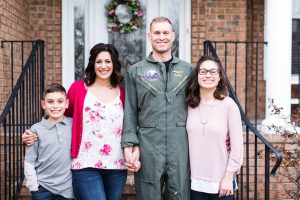Published: May 3, 2021

One Choice MilFams Shouldn’t Have to Make
Military life comes with a unique set of challenges for all families—from deployments to frequent moves, time away for training, and the general unpredictability of not knowing what lies ahead, just to name a few. But what happens when your family is thrown an extra curveball? For example, when you have one or more members with needs that qualify them as an “exceptional family member”? Navigating the uncertainty of military life with a child or spouse who has specific, and sometimes extensive, medical or educational needs can feel overwhelming at best.
According to the 2020 Military Family Lifestyle Survey, 24% of active-duty family respondents reported their family was enrolled in the Exceptional Family Member Program (EFMP), a program that is intended to ensure family members’ special needs are considered during the assignment process. Most active-duty spouses who were enrolled in the EFMP were enrolled for a child (75%), but 42% were enrolled for themselves, and 4% were enrolled for their spouse.
 For Michelle, a Navy spouse for over 25 years and a mother of a 17-year-old daughter with cerebral palsy, she knows all too well the obstacles of managing military life as an EFMP family. While Michelle and her husband consider it an incredible honor and privilege to serve, they have had to overcome unique trials as it relates to the stability of care and education for their daughter. “Before kids, my husband and I moved 10 times together,” Michelle shared. “After having our daughter, we have moved four times as a family, while my husband has moved four additional times without us. Since our daughter was born 17 years ago, my husband has also completed seven deployments of varying lengths.”
For Michelle, a Navy spouse for over 25 years and a mother of a 17-year-old daughter with cerebral palsy, she knows all too well the obstacles of managing military life as an EFMP family. While Michelle and her husband consider it an incredible honor and privilege to serve, they have had to overcome unique trials as it relates to the stability of care and education for their daughter. “Before kids, my husband and I moved 10 times together,” Michelle shared. “After having our daughter, we have moved four times as a family, while my husband has moved four additional times without us. Since our daughter was born 17 years ago, my husband has also completed seven deployments of varying lengths.”
Time apart comes with the territory for military families. But the sad reality is, many families, especially EFMP families, are choosing to spend even more time away due to their needs. “Our biggest sacrifice has been living apart to ensure my daughter had access to appropriate education and medical services,” Michelle said. ”It has not been easy. We have had our fair share of legal battles with our school district for many years over her IEP [Individualized Education Plan]. Our daughter has now testified twice in court. Our entire family will have long-lasting effects of enduring those battles that we likely could have avoided if we were stable in one community.”
Michelle isn’t alone. Nearly a quarter (23%) of active-duty family respondents to the 2020 MFLS reported they had geo-bached (when a military family chooses to live in a different location from the service member) in the last five years. The most common reasons are for spouse employment or their children’s education. When military families, who already endure so much time apart, make the heartbreaking choice to live separately, it’s time to re-examine what families need, how we are supporting them, and if the programs designed to help them, like the EFMP, are working and working well.
And the pandemic has only amplified this issue. For Michelle, she and her family were living in Virginia Beach when her husband had orders to be stationed in Italy. She had just fought and won her battle with the local school system to provide their daughter her legally required education. Moving the family would mean going back to square one. So, for the well-being of their children, they decided to live separately once again. Little did they know, not long after her husband departed for Italy, the world would shut down. While health and well-being have been at the forefront of everyone’s mind this past year, it became the only focus for Michelle’s family.
husband had orders to be stationed in Italy. She had just fought and won her battle with the local school system to provide their daughter her legally required education. Moving the family would mean going back to square one. So, for the well-being of their children, they decided to live separately once again. Little did they know, not long after her husband departed for Italy, the world would shut down. While health and well-being have been at the forefront of everyone’s mind this past year, it became the only focus for Michelle’s family.
“We shut everything down to make sure she [our daughter] stayed safe because we knew if she got sick, it would not go well,” Michelle recalled. “We canceled all respite care, which was something I relied on with my husband overseas. I needed those breaks but couldn’t risk bringing people into my home.” While Michelle focused on her children, especially her daughter, her mental health over the past year suffered in a major way. “I didn’t realize the stress I was holding in, worried about [my husband’s] safety, until he came home and I let it all out in tears,” Michelle candidly shared. ”Worry for him, worry for my medically-complex daughter. My mental health was maxed out, and I struggled.”
Sadly, once again, Michelle isn’t alone. Sixty-two percent of active-duty spouse respondents to the MFLS said COVID-19 had made their mental health worse or much worse. But Michelle is committed to military life and making it work for them. And she wants to help other families do the same. That’s why she started a nonprofit called Partners in PROMISE to support families with special education concerns and help them navigate resources. Its main mission is to remove those educational hurdles so families can do what they do best: serve this great country.
 At Blue Star Families, we know when family members are connected and supported at home, mission readiness improves. So we’re working hard to arm advocates, like Michelle, with the data they need to demonstrate the struggles military families are facing. Together, we can shine a light on the impossible choices families are making every day to create positive, lasting change.
At Blue Star Families, we know when family members are connected and supported at home, mission readiness improves. So we’re working hard to arm advocates, like Michelle, with the data they need to demonstrate the struggles military families are facing. Together, we can shine a light on the impossible choices families are making every day to create positive, lasting change.
If you too are a military connected caregiver and want to learn more about the resources available to help you, please join us at our upcoming town hall event, Military Caregivers: Celebrating America’s Hidden Heroes, on May 18th. Reserve your spot today!
Posted In:







